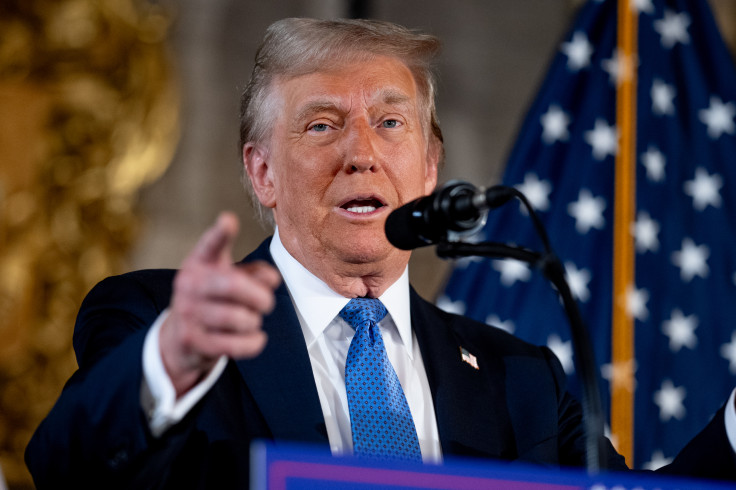
With just weeks until President-elect Donald Trump takes office, Republicans close to him have been touting a potential "soft invasion" of Mexico, which would entail sending troops across the border to eliminate cartel leaders and operatives. While it remains unclear if the incoming administration will actually carry through these hints, experts are already warning of increased violence if the plans are actualized.
During his 2024 campaign, Trump suggested he'd consider invading or bombing Mexico to fight drug cartels.
Back in July, Fox News's Jesse Watters asked Trump if he'd consider strikes against drug cartels operating in the country. Trump said yes, although the statement was also interpreted as a potential threat against the Mexican government in hopes of decreasing cartels' influence. "Mexico's gonna have to straighten it out really fast, or the answer is absolutely," the former president said.
But Trump's hints at a special Mexican operation did not stop on the campaign trail. In fact, since he declared victory in the November elections, the President-elect has seemingly taken steps to bring the soft invasion into fruition.
Some of Trump's Cabinet picks, including his choices for secretary of defense, secretary of state, and border czar, have publicly supported the idea of sending troops to Mexico. Trump's pick for national security adviser, Rep. Mike Waltz (R-Fla.), along with Rep. Dan Crenshaw (R-Texas) even co-introduced legislation last year to create an Authorization for Use of Military Force to target Mexican drug cartels.
Plans presented to Trump have included airstrikes on cartel infrastructure, assassinating cartel leaders, and training Mexican forces to complete those tasks, according to Rolling Stone. The scheme would most likely include covert operations and patrol just over the border to stem the flow of drugs across the border.
Some of the top picks for his administration favor the more hawkish options. Rep. Mike Waltz, Trump's pick for national security adviser, introduced a bill along with Dan Crenshaw to authorize the use of military force against Mexican cartels. "We must start treating them like ISIS," Crenshaw said when introducing the legislation.
But could a special operation in Mexico realistically take place? Experts seem to disagree.
The outlet interviewed half a dozen former special operations soldiers and intelligence agents about the matter. They said that an operation of that nature in Mexico would be easy to carry out, at least on paper, since the U.S. military— particularly units like SEAL Team Six and Delta Force— have mastered those kinds of operations after two decades of war in Iraq and Afghanistan.
But Caralyn Gallaher, a professor studying guerilla and paramilitary violence at American University's School of International Service, says the idea is absurd. She researched cooperation between U.S. and Mexican law enforcement in the mid-2000s and says one takeaway from the Mexicans was that it was a mistake to target cartel leaders.
"All you do is create a succession crisis," she says. "And a succession crisis in a drug cartel looks different than a succession crisis in, like, [Rupert] Murdoch's empire, right? It's basically settled with violence."
Another former Marine officer pointed out to Rolling Stone that the potential airstrikes and assassination plans presented to Trump sound familiar.
"That sounds a whole lot like what we did in Afghanistan for 20 years unsuccessfully," said the Marine officer who worked with special operations there.
Other scholars also highlight that an operation in Mexico could risk American lives, since cartels have extensive tactical training from Mexican military defectors, who have also been trained by American special operations.
"Directing American special operations forces against the cartels would put them up against a sizable near-peer competitor in asymmetric warfare, thus putting the U.S. government into a position of little escalatory advantage," said Brandan P. Buck, a researcher at the Cato Institute. "Such a move would not just force the American military into another quagmire; it would drop them into a morass up to their metaphorical waist."
But despite potential plans from the new administration, the Mexican government, led by President Claudia Sheinbaum, have not been shy to show their opposition.
"There won't be an invasion," Sheinbaum said at a recent news conference. "It's not going to happen."
Similarly, the Mexican administration has declared that any U.S. soldiers or agents involved in the killing or capture of a narcotics boss within Mexico could face murder or kidnapping charges in Mexico.
"A unilateral act without Mexican permission would be a disaster," said Michael Burgoyne, a retired U.S. Army colonel and former military attaché in Mexico City.
© 2025 Latin Times. All rights reserved. Do not reproduce without permission.




